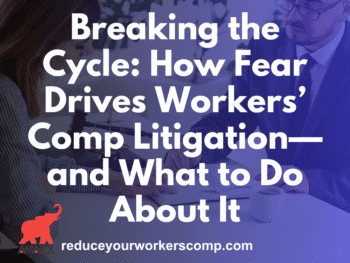Our Tips from Ted Column continues with some sage advice about the best defense is a well-prepared offense.
Many employers limit their participation in their own workers comp claims hoping the carrier will do nearly all of the work. It seems, to many employers, it goes with the premium. However, as any trial attorney appreciates, whoever volunteers to become the communications center controls the progress of the claim.
Communications in workers compensation claims are quite complex. It is wrong to imagine the parties (employer and worker) are not allowed to communicate with each other during a claim. This is entirely false and the law requires each MUST stay in touch. In addition, one or both must often communicate with the carrier, the Workers Compensation Board, medical providers, health insurance and group disability carriers as well as a variety of agencies.
Unless properly coordinated, the flow of data among all these entities quickly brings a claim to a halt. Delay costs money in workers comp claims settlement and only the employer pays. (WCxKit)
The cheapest and fastest way an employer can prevent unnecessary delay and confusion is to make sure all other parties are copied on any piece of information the employer receives, from whatever source. Group medical plans are especially concerned about their paying unintentionally for a comp claim. Employers often receive requests for information during a claim. Resist the temptation to refer the requests to someone else or stonewall the situation. By coordinating the requests with other parties you will maintain control and limit misunderstandings, a leading cause of soaring expense and lost time.
It is a misconception to think medical information is automatically protected by a “right to privacy.” Whenever a claim for disability is made the “right to confidentiality” is waived. (“Right to privacy” does not apply to medical records, although the term is often misapplied to what is “right to confidentiality.”) (WCxKit) Health Insurance Portability and Accountability Act (HIIPAA) waivies this right asit relates to occupational injuries.
Actually, HIPAA never applies to a court or administrative proceeding. Everyone thinks it does, thanks to the cautious people who gave the talks at conferences for carriers, hospitals and medical groups when HIPAA was first passed. "You shouldn't do that. You might get sued. Just say, 'No!'" And they all did.
Don't ask people with a fear of heights to teach tight-rope walking.
Every year seems to bring new players into the field of employee benefits with ever more exchanges required. Stonewalling will work, for a while, but the bill to be paid in the end will be much higher.
Author: Attorney Theodore Ronca is a practicing lawyer from Aquebogue, NY. He is a frequent writer and speaker, and has represented employers in the areas of workers' compensation, Social Security disability, employee disability plans and subrogation for over 30 years. Contact Attorney Ronca at 631-722-2100.
Work Comp Calculator: http://www.LowerWC.com/calculator.php
Light Duty Calculator: http://www.LowerWC.com/transitional-duty-cost-calculator.php
Do not use this information without independent verification. All state laws vary. You should consult with your insurance broker or agent about workers' comp issues.
©2010 Amaxx Risk Solutions, Inc. All rights reserved under International Copyright Law. If you would like permission to reprint this material, contact Info@WorkersCompKit.com



























